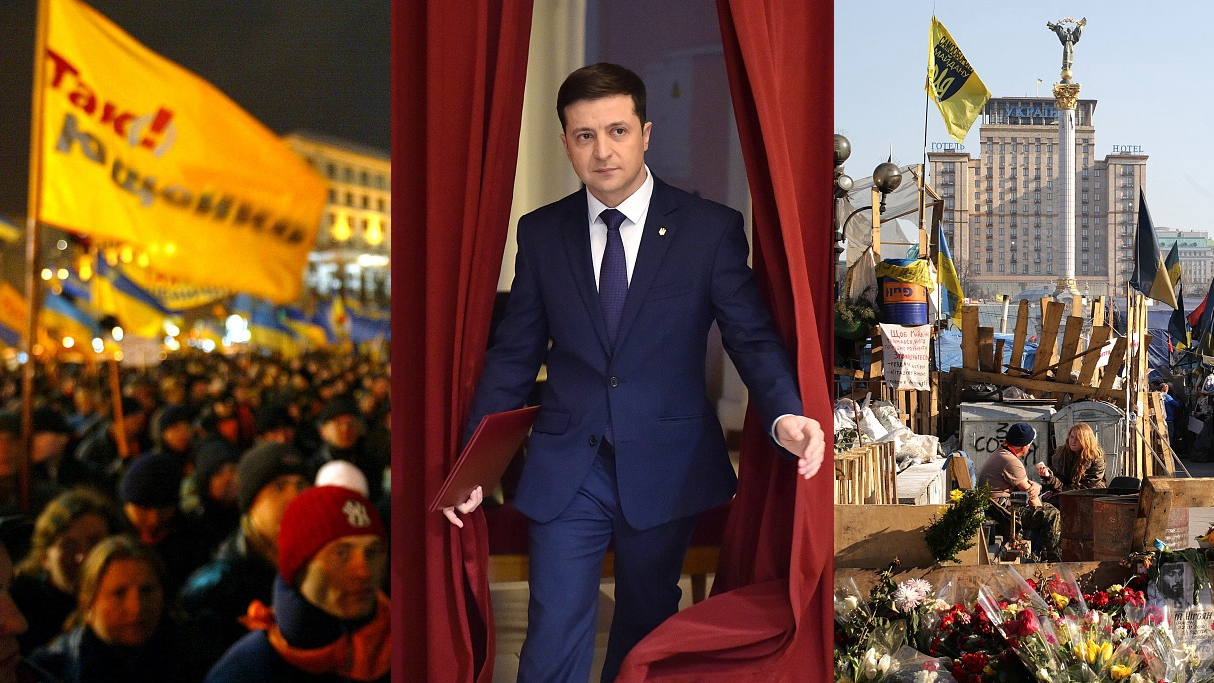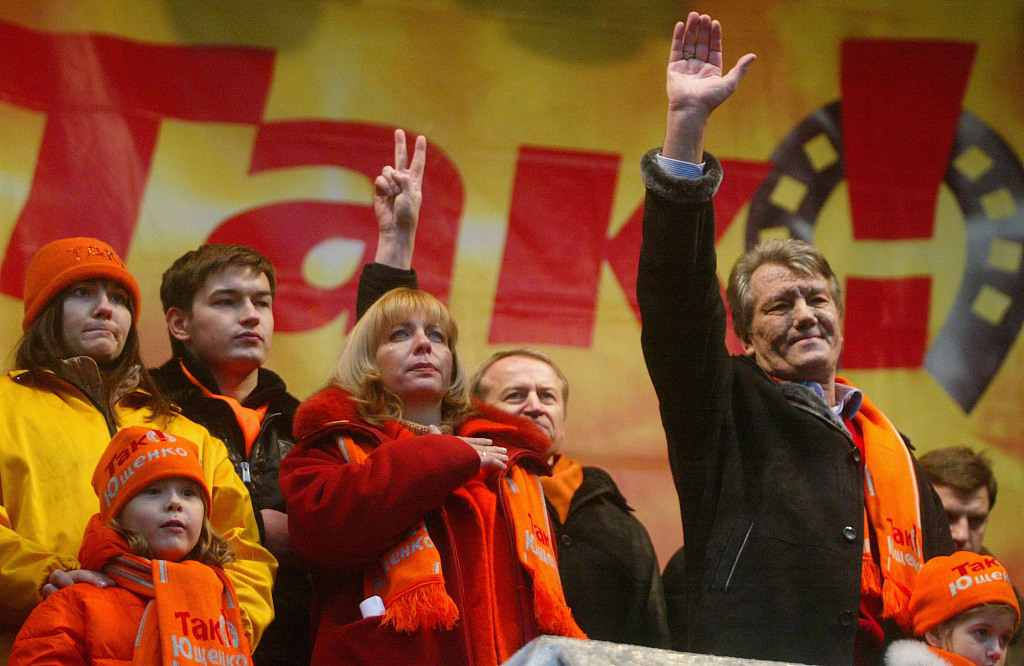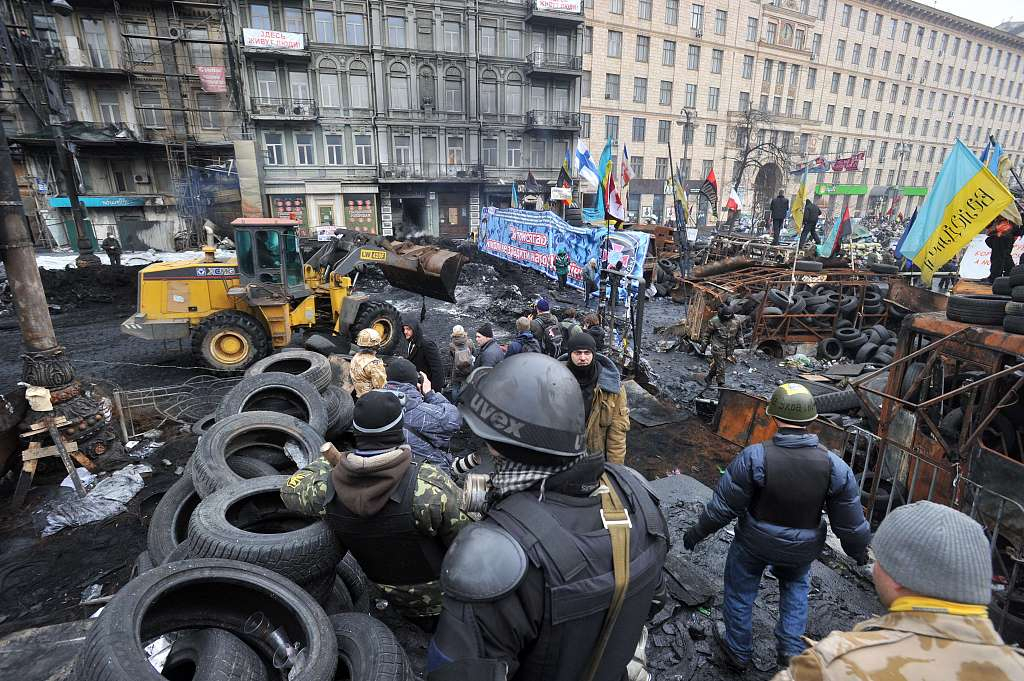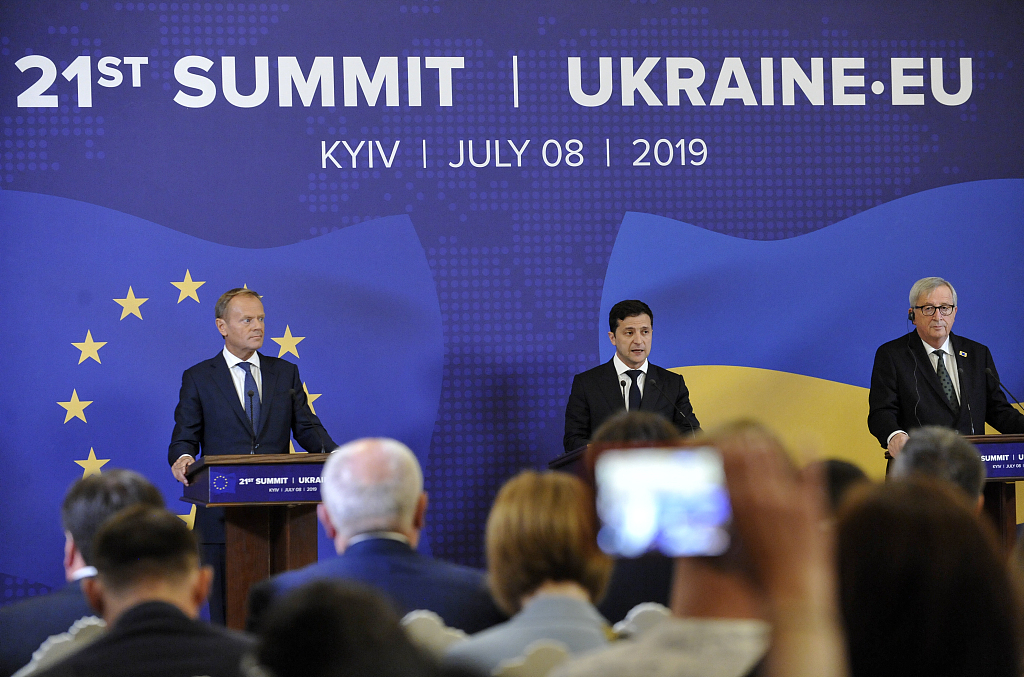
L-R: Orange Revolution protesters in Kyiv, Ukraine, November 27, 2004; comedian and presidential candidate Volodymyr Zelenskyy, March 6, 2019; Euromaidan barricades in central Kyiv, March 12, 2014. /CGTN montage of VCG pictures
L-R: Orange Revolution protesters in Kyiv, Ukraine, November 27, 2004; comedian and presidential candidate Volodymyr Zelenskyy, March 6, 2019; Euromaidan barricades in central Kyiv, March 12, 2014. /CGTN montage of VCG pictures
On November 22, 2004, a movement that would become known as the Orange Revolution swept through Ukraine as people took to the streets to protest the results of a rigged presidential run-off.
Nine years later, unrest erupted as pro-EU demonstrators clashed with a government more keen to look eastwards towards Russia.
With a cast of recurring characters jostling for power, influence and business contracts, the last 15 years have been turbulent for Ukrainian domestic politics.
So how far has it come and what do its EU prospects look like now?
An Orange Revolution
When Prime Minister Viktor Yanukovych was announced as the winner of the presidential run-off on November 21, 2004, ahead of opposition candidate Viktor Yushchenko and amid allegations of voter fraud, it brought a torrent of people into the streets and, for two weeks, orange flags – the color of Yushchenko's Our Ukraine party – flew over Kyiv's central Maidan square and in other major cities.
Yanukovych and Yushchenko effectively represented Ukraine's East-West divisions, with the former seen as pro-Moscow and the latter as pro-Western.
The Orange Revolution, spearheaded by Yushchenko and ally Yulia Tymoshenko, fueled an atmosphere of hope, as Ukrainians used the opportunity to protest the power of oligarchs and widespread corruption in the country.

Opposition presidential candidate Viktor Yushchenko waves to supporters at an Orange Revolution rally in Kyiv, Ukraine, November 27, 2004. /VCG Photo
Opposition presidential candidate Viktor Yushchenko waves to supporters at an Orange Revolution rally in Kyiv, Ukraine, November 27, 2004. /VCG Photo
With public pressure unrelenting, a rerun of the election was ordered and Yushchenko, this time, came out on top.
But amid political bickering, unfulfilled promises and continued corruption, the optimism of the Orange Revolution quickly faded.
Over the next decade, the top three players would trade places, forming alliances and falling out repeatedly, and when Yanukovych succeeded Yushchenko as president in 2010, it seemed Ukraine was back to square one.
"Corruption and cronyism were supposed to give way to transparency and democracy. 'Bandits' were meant to be jailed, dubious privatizations were meant to be reversed. EU and NATO membership appeared to be within reach. It has not quite worked out like that," BBC correspondent Stephen Mulvey noted two years after the Orange Revolution.
'Ukraine is Europe'
Yanukovych's decision to abandon a planned Association Agreement with the European Union in November 2013 would bring the situation in Ukraine to a boil.
Nine years – almost to the day – after the Orange Revolution, Ukrainians once again flooded Kyiv's Maidan square, this time chanting "Ukraine is Europe."
The Euromaidan movement would go on for months, culminating in violent clashes with security forces that left over 100 dead, and in Yanukovych's flight to Russia and removal from office.

Euromaidan self-defense activists watch as barricades are cleared in Kyiv, Ukraine, February 16, 2014. /VCG Photo
Euromaidan self-defense activists watch as barricades are cleared in Kyiv, Ukraine, February 16, 2014. /VCG Photo
The Association Agreement between the EU and Ukraine, seen as a first step towards integration into the bloc, was finally signed in March 2014.
But the failure of Yanukovych's successor, billionaire-president Petro Poroshenko, to tackle corruption and improve people's livelihoods saw him voted out of office this year after just one term, replaced by a TV comedian famous for playing a sitcom president.
Out with the old, in with the new
Despite having no political experience and few clear policies, Volodymyr Zelenskyy won in a landslide in April with 73-percent support, and his Servant of the People party went on to secure a majority in parliament – the Rada – three months later.
In a country dominated for years by an old guard eager to protect its interests – observers often described them as neither pro-EU, nor pro-Russia, but "pro-themselves" – Zelenskyy has been a welcome change, ushering in a new generation of politicians.
The new Rada adopted anti-corruption legislation on its first day, ending immunity from prosecution for MPs, and there has been a "virtual clean-out of the Poroshenko administration," with few members kept on in the new cabinet, Michael Emerson, associate senior research fellow at the Center for European Policy Studies (CEPS), noted in a recent paper.
With a 35-year-old prime minister, Oleksiy Honcharuk, a cabinet of pro-EU and reform-oriented ministers, and a huge number of young, new MPs, the new set-up marks a "decisive break with the past," Emerson added.
But Zelenskyy's biggest test will be whether he, unlike those before him, can once and for all dismantle the wide web of corruption that has plagued Ukraine for decades and push through judicial, security service and land reforms.

L-R: European Council President Donald Tusk, Ukrainian President Volodymyr Zelenskyy and European Commission President Jean-Claude Juncker at a press conference in Kyiv, Ukraine, July 8, 2019. /VCG Photo
L-R: European Council President Donald Tusk, Ukrainian President Volodymyr Zelenskyy and European Commission President Jean-Claude Juncker at a press conference in Kyiv, Ukraine, July 8, 2019. /VCG Photo
His task has been made trickier by the U.S. impeachment scandal, which he has been unwittingly drawn into, while fighting continues in the eastern Donbas region, with an estimated death toll of 13,000 over the past six years.
Countdown to EU
Ukraine is still not officially a candidate or potential candidate country for EU membership. But while past governments have wavered over integration into the bloc, the new guard has made its intentions crystal clear.
"Ukraine is already a part of the European family," Zelenskyy told German tabloid Bild in June.
"We understand that we need to deliver compelling results to be able to join the common economic, legal, customs, and digital space of the EU… And we will do everything to reach this."
A majority of the Ukrainians are in favor of joining the EU, according to recent polls, and 68 percent would like to see Kyiv continue pro-EU reforms even if membership does not materialize: until Ukraine effectively carries out far-reaching reforms, experts say it will fail to receive the much-needed foreign investments it needs to boost its economy.
Eager to prove it is not making empty promises, Zelenskyy's government has already set a timeline for itself.
"The goal is… five years," Dmytro Kuleba, vice prime minister for European and Euro-Atlantic Integration, told Euractiv in a recent interview. "In five years we want to meet the accession criteria."
"We are moving towards full membership of the EU and NATO… And we will be ready for the moment when the opportunity comes."
Fifteen years after Orange Revolution protesters defied freezing weather to demand freedom, justice and an end to graft, there is again hope of change in Ukraine.